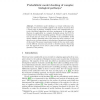137
click to vote
SIGMETRICS
2008
ACM
15 years 2 months ago
2008
ACM
Gossip protocols have been proposed as a robust and efficient method for disseminating information throughout dynamically changing networks. We present an analysis of a gossip pro...
136
Voted
MASCOTS
2004
15 years 3 months ago
2004
In this paper, we describe the dual-processor parallelisation of a symbolic (BDD-based) implementation of probabilistic model checking. We use multi-terminal BDDs, which allow a c...
131
Voted
CMSB
2006
Springer
15 years 5 months ago
2006
Springer
Abstract. Probabilistic model checking is a formal verification technique that has been successfully applied to the analysis of systems from a broad range of domains, including sec...
194
click to vote
ARTS
1999
Springer
15 years 6 months ago
1999
Springer
Model checking can tell us whether a system is correct; probabilistic model checking can also tell us whether a system is timely and reliable. Moreover, probabilistic model checkin...
190
click to vote
LICS
2003
IEEE
15 years 7 months ago
2003
IEEE
Probability features increasingly often in software and hardware systems: it is used in distributed co-ordination and routing problems, to model fault-tolerance and performance, a...
129
click to vote
ETFA
2008
IEEE
15 years 8 months ago
2008
IEEE
The reactivity of Networked Automation Systems (NAS) has direct influence on safety and quality aspects. It can be determined by a response time analysis, which itself can be calc...
107
click to vote
COMPSAC
2008
IEEE
15 years 8 months ago
2008
IEEE
This work introduces probabilistic model checking as a viable tool-assisted approach for systematically quantifying DoS security threats. The proposed analysis is based on a proba...
161
click to vote
CONCUR
2009
Springer
15 years 8 months ago
2009
Springer
Abstract. The technique of partial order reduction (POR) for probabilistic model checking prunes the state space of the model so that a maximizing scheduler and a minimizing one pe...
127
click to vote
VMCAI
2010
Springer
15 years 11 months ago
2010
Springer
This paper investigates relative precision and optimality of analyses for concurrent probabilistic systems. Aiming at the problem at the heart of probabilistic model checking ? com...




